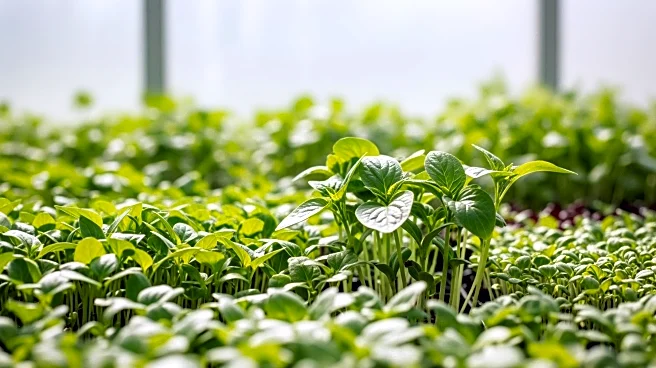What's Happening?
Bikash Chandra Sarker, an agri-entrepreneur from Manikganj, has transformed seedling production using techniques learned from YouTube during the COVID-19 lockdown. By employing plastic trays in polyshade
houses, Bikash successfully produced high-quality vegetable seedlings, including broccoli, cauliflower, and tomatoes. His initiative has expanded to three polyshade houses, employing eight to ten workers, and has significantly improved local seedling quality and availability. Farmers from surrounding areas now prefer Bikash's seedlings due to their strength and health, reducing dependency on distant suppliers. The Department of Agricultural Extension supports his efforts, providing technical advice and infrastructure assistance.
Why It's Important?
Bikash's innovative approach to seedling production demonstrates the potential of digital platforms like YouTube in disseminating agricultural knowledge. This method not only enhances local agricultural practices but also creates employment opportunities and boosts economic activity in rural areas. The success of Bikash's nursery highlights the importance of accessible technology in empowering small-scale farmers and improving food security. By reducing costs and risks associated with traditional farming, polyshade houses offer a sustainable solution for high-quality seedling production, potentially influencing agricultural practices beyond Manikganj.
What's Next?
Bikash plans to expand his nursery by increasing the number of polyshade houses and establishing a training center for young farmers. This expansion aims to further enhance local agricultural skills and create more employment opportunities. The continued support from the Department of Agricultural Extension will be crucial in scaling these efforts and ensuring the sustainability of Bikash's model. As demand for high-quality seedlings grows, Bikash's approach could serve as a blueprint for other regions seeking to improve agricultural productivity and resilience.
Beyond the Headlines
The success of Bikash's seedling production underscores the transformative impact of digital learning in agriculture. It raises questions about the role of technology in rural development and the potential for similar initiatives to address challenges in other sectors. The collaboration between local farmers and government agencies exemplifies effective public-private partnerships in fostering innovation and economic growth. Bikash's story may inspire other entrepreneurs to leverage digital resources for sustainable development.









